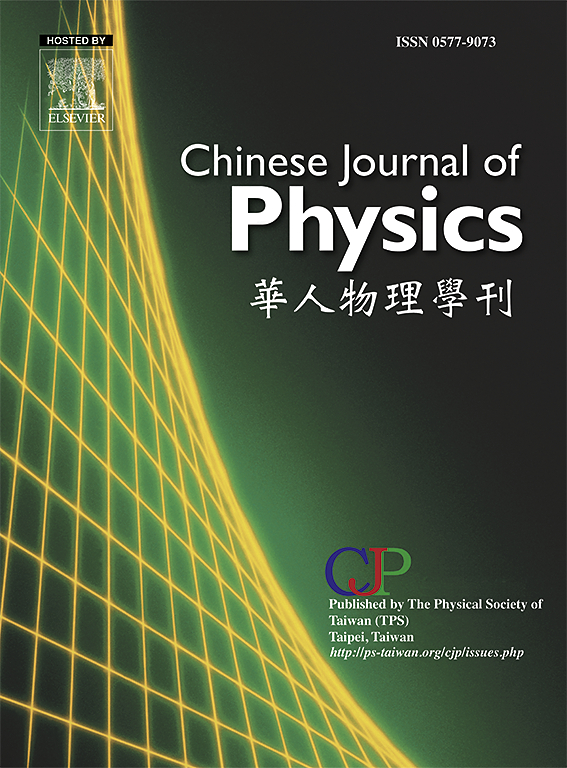Dynamics of a stochastic impulsive vegetation system with regime switching
IF 4.6
2区 物理与天体物理
Q1 PHYSICS, MULTIDISCIPLINARY
引用次数: 0
Abstract
This paper describes an analytical and numerical investigation of a novel stochastic impulsive vegetation system with regime switching. Impulsive control, white noise, regime switching, and rainfall are modeled as crucial factors to simulate natural ecological phenomena, with the aim to explore the effects of those factors on the dynamics of vegetation system. Dynamics of the system, including the existence and uniqueness of global positive solutions, extinction, non-persistence in the mean, weak persistence and stochastic persistence, are investigated firstly under the effects of impulsive control and regime switching. For system without impulsive perturbations, we investigate the existence and uniqueness of the stationary distribution for the system, demonstrating that the vegetation can survive forever. Using a sophisticated sensitivity analysis technique, it is found that the vegetation biomass is highly sensitive to the rainfall but least sensitive to the saturation constant of the vegetation consumption. Our numerical results reveal that either the reduced rainfall or increased environmental disturbance can tip the balance of vegetation system, but this relationship can be effectively regulated by implementing impulsive control schemes. Additionally, it is observed that system at high-level rainfall may be detrimental to maintain the balance of vegetation, but regime switching in rainfall patterns can balance different states of vegetation and provide higher survival chance for vegetation. Significantly, it emphasizes that the persistence-extinction behaviors of the vegetation are more sensitive to the change of regime switching, indicating that the proper and general environmental disturbances is beneficial to maintain dynamic balance of vegetation system. These findings may provide new insights into the complex vegetation system dynamics.
具有系统切换的随机脉冲植被系统的动力学特性
本文描述了对一种新型随机冲动植被系统的分析和数值研究。将脉冲控制、白噪声、制度切换和降雨作为模拟自然生态现象的关键因素建模,旨在探讨这些因素对植被系统动力学的影响。首先研究了冲动控制和制度转换影响下的系统动力学,包括全局正解的存在性和唯一性、消亡、均值不持续、弱持续和随机持续。对于无脉冲扰动的系统,我们研究了系统静态分布的存在性和唯一性,证明植被可以永久生存。利用复杂的敏感性分析技术,我们发现植被生物量对降雨量高度敏感,但对植被消耗饱和常数的敏感性最低。我们的数值结果表明,降雨量减少或环境干扰增加都会破坏植被系统的平衡,但这种关系可以通过实施脉冲控制方案得到有效调节。此外,我们还观察到,高降雨量系统可能不利于维持植被平衡,但降雨模式的制度转换可以平衡植被的不同状态,为植被提供更高的存活机会。值得注意的是,该研究强调植被的存活-消亡行为对雨量变化更为敏感,表明适当的一般性环境干扰有利于维持植被系统的动态平衡。这些发现可为复杂的植被系统动力学提供新的见解。
本文章由计算机程序翻译,如有差异,请以英文原文为准。
求助全文
约1分钟内获得全文
求助全文
来源期刊

Chinese Journal of Physics
物理-物理:综合
CiteScore
8.50
自引率
10.00%
发文量
361
审稿时长
44 days
期刊介绍:
The Chinese Journal of Physics publishes important advances in various branches in physics, including statistical and biophysical physics, condensed matter physics, atomic/molecular physics, optics, particle physics and nuclear physics.
The editors welcome manuscripts on:
-General Physics: Statistical and Quantum Mechanics, etc.-
Gravitation and Astrophysics-
Elementary Particles and Fields-
Nuclear Physics-
Atomic, Molecular, and Optical Physics-
Quantum Information and Quantum Computation-
Fluid Dynamics, Nonlinear Dynamics, Chaos, and Complex Networks-
Plasma and Beam Physics-
Condensed Matter: Structure, etc.-
Condensed Matter: Electronic Properties, etc.-
Polymer, Soft Matter, Biological, and Interdisciplinary Physics.
CJP publishes regular research papers, feature articles and review papers.
 求助内容:
求助内容: 应助结果提醒方式:
应助结果提醒方式:


